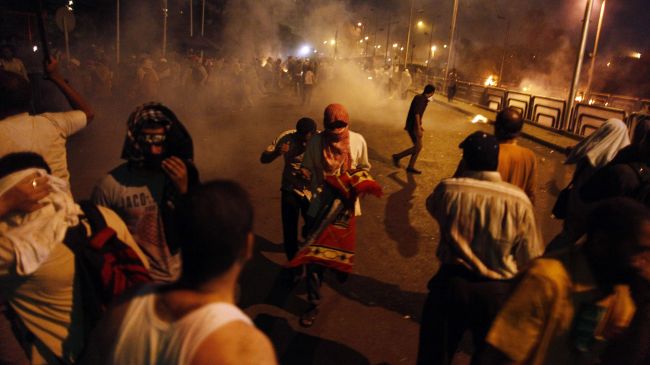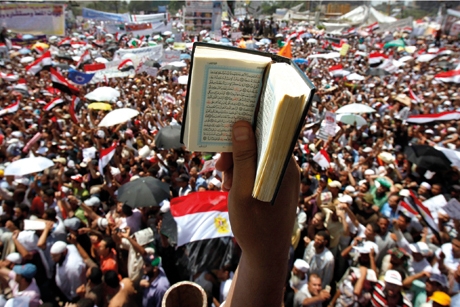There is every reason for doubt, and even alarm, about developments in Egypt. I have written, stated and often repeated that the uprising that led to the events of January 25 2011 was hardly as spontaneous as it seemed and that, since then, the military—or at least a particular faction within the Supreme Council of the Armed Forces—(SCAF) has never entirely lost control of the situation. Confirmation came with the astonishing condemnation of former president Hosni Mubarak and the acquittal of all but one of the other accused (including his sons, whose involvement in the shady inner workings of the former regime and role in high level corruption were an open secret). The picture is one of carefully orchestrated “change” that has allowed the power structure to rid itself of embarrassing elements while consolidating its political, military and economic domination. I cannot help thinking back to the words of Henri Guaino, Nicolas Sarkozy’s former advisor, after a television debate in November 2011: “There has been no revolution in Egypt. Only a military coup d’état.”
The candidate of the Muslim Brotherhood (MB) scored a narrow victory in the first round. Before looking more closely at what his victory means, it would be appropriate to analyze the organization’s positions. The MB did not participate in the earliest demonstrations; it was not until much later (officially, on the eve of January 25) that it joined the mass movement that had taken to the streets against the dictatorial Mubarak regime. The younger generation of the MB had forced the leadership’s hand; the tension and internal division that followed were substantial and lasting. The MB finally got a strong position within the uprising due to its historical credibility in opposition (where its members were tortured, imprisoned, and exiled), to being seen as the protectors of the Islamic reference, as well as to their superior organization and grass-roots capacity for mobilization. This led to an excellent score in the country’s parliamentary elections. But the surprise participation of the Salafis, whose presence seemed designed to embarrass the MB, placed the MB in a delicate position between the military establishment, the secularists and the Salafis. Some members of the organization made no secret of their contacts with the Armed Forces. Concerned with playing a lead role and with protecting their dominant position led them to adopt strategies that widened the gap between the organization and popular aspirations, and led them to lean toward the SCAF. The MB reacted timidly to the abolition of the committee formed to draft a new constitution that cast a shroud of uncertainty over the political and electoral process, raising questions about democratic transparency and the role and legitimacy of the institutions of the state.
The MB had promised that its party, Freedom and Justice, would not field a candidate in the presidential election. The decision was one of the reasons for the expulsion of Abd al-Moneim Abu al-Futuh from the organization, which had opposed his candidacy. Shortly thereafter, in an abrupt about-face, the MB nominated Khayrat al-Shater, and then, Mohammad Morsi. The decision was a curious one, motivated either by assurance of victory at the ballot box, or by the self-interested encouragement of a SCAF anxious to split opposition ranks. Instead of its historical role as a party of opposition to the power structure, the MB suddenly found itself caught up in a race for the presidency that demanded compromises, undercut the very basis of its credibility and raised questions about its choices, and about the role and intentions of the military. The first round results, said to have been free and fair, were startling: Mohammad Morsi had a narrow lead over the former regime’s candidate, a friend of the military and protector of its economic privileges and murky financial interests. There had been no fraud, it was asserted. But the outcome could not have better suited the new power center in the post-Mubarak military.
Having won by a small margin, the MB could not very well contest the outcome, and all the other candidates displayed great caution. But the days that followed the election provided disturbing indications. Curious coalitions, unexpected declarations by one candidate or another created a sense, among the people, of being caught in a difficult and frustrating choice. One candidate directly affiliated with the former regime, and another representing an organization whose message had been muddled and contradictory, an organization that surely represented one third of popular opinion, but that had also agreed to deal with the military out of concern first and foremost for its own political fortunes. Encouraged and perhaps hypnotized by the Turkish and Tunisian examples, the MB may well have believed that their time had come.
But it is impossible to overlook the succession of strategic and tactical errors and political failings that are likely to have a high cost, not only for the organization, but also for the entire country and its future. Management of diversity of opinion internally; the newly-created party’s rigid membership regulations; the absence of openness to the youth; the expulsion of dissenting voices; the decision to participate in the presidential election; relations with the military, etc.: all these factors raise serious and fundamental questions about the organization’s orientations and objectives. In the aftermath of the first round, everything tends to indicate that the MB may well have functioned as a cat’s paw for the military. A victory for Ahmad Shafiq is now probable, given the prevailing confusion—and the manipulative skills of the former regime. The life sentence handed down to Mubarak and the acquittal of his sons and the other co-accused must be interpreted symbolically. Far from favoring the MB, it revealed the SCAF as a powerful behind-the-scenes presence. In Egypt’s emerging new order, certain people are to be protected and others simply relocated; but much of the former regime’s practices will persist.
The Tunisian example (and the Turkish precedent), as well as the aspiration for recognition (after sixty long years of opposition and underground existence), seems to have misled the leaders of the organization and the party that, after the first round, finds itself in first place and yet trapped. Did the military simply use them to legitimize the transition to a military-democratic system far less transparent than it appears at first glance? The cost in terms of credibility has been high. Should the MB win the election, which would be surprising, it would find itself in a near-untenable position, facing political, social and economic obstacles that it would find daunting to overcome. Its situation is in no way comparable to Turkey’s: the MB might well chose to integrate itself into the dominant capitalist economy by signaling its readiness to deal with the World Bank and the International Monetary Fund, but Egypt’s economy is far weaker than Turkey’s, and its place in the Middle East is far more sensitive, particularly with regard to the Israel-Palestine conflict. The MB may well win the presidential election, but everything indicates that a broader victory is most likely to elude it.
The situation in Egypt is serious. As the second round approaches the two possible scenarios seem far removed the earlier promise of stability and social peace. Should Ahmad Shafiq be returned to power, it is certain that many people will take to the streets, and that this time, the military will not play the role of passive spectator that it did in early 2011, invoking this time the democratic legitimacy derived from the ballot box. Let us hope that the people, and particularly the young people, will remain active without falling into the trap of violence. The Egyptian spring is far behind us now; the revolution may be just beginning—or it may have been aborted…if it ever truly existed.
Source: http://gulfnews.com/opinions/columnists/the-muslim-brotherhood-s-historical-challenge-1.1034594









